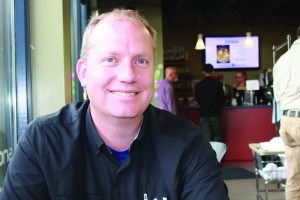
On day 14, Jasper’s Victim Services director, Paul Schmidt said he isn’t usually one to buy into social media trends, but when he was nominated to do the 22 push-up challenge for Post Traumatic Stress Disorder, he said the cause struck too close to home to not participate.
“I know a lot of RCMP officers and emergency responders who probably have PTSD. You can see it in their eyes—like they’re in a state of shock or like they’re there but not really attentive because they are somewhere else,” Schmidt said. “Even in my line of work I’ve seen some pretty horrendous things so PTSD is something I’m also concerned about for myself.
“I think about it a lot actually.”
Schmidt said a lot of what he does is “street-level social work.” When someone has just been assaulted, or a loved one has just been killed in a car crash, or has been victimized in any way in Jasper, he or one of his volunteer advocates is there to make sure that person has support.
That could mean setting them up with a hotel for the night, arranging for a rental car, or even bringing them a blanket and some coffee. But it also means just being with them, and helping them through the trauma.
The latest viral craze involves filming yourself doing 22 push-ups every day for 22 days—for each day participants are supposed to post their videos to social media. Once completed, you nominate friends to do the same, similar to the ALS Ice Bucket Challenge, which was started to raise funds and awareness for a worthy cause.
For Schmidt, he decided to take on the challenge with a bit of a twist. Instead of just posting videos of himself doing the repetitive two-armed hustle, with each post he’s been including educational articles related to the mental condition.
“PTSD gets a lot of attention and that’s great, but I really want to turn that around and look at what you can do for it and how you can take care of yourself if you are experiencing symptoms,” Schmidt said. “I honestly don’t think anyone can immunize themselves and say that they’ve done everything and that they’ll never get sick because a mental sickness can happen to anyone at any time.
“So for me, that’s why it’s worth talking about and that’s why it’s worth doing these 22 push-ups.”
According to the Canadian Mental Health Society, PTSD is a mental illness, which involves exposure to trauma involving death or the threat of death, serious injury or sexual violence.
Traumatic events may include crimes, natural disasters, accidents, war or conflict, or other threats to life. It could be an event or situation that you experience yourself or something that happens to others, including loved ones.
PTSD causes intrusive symptoms such as re-experiencing the traumatic event. Many people have vivid nightmares and flashbacks. They often avoid things that remind them of the event—for example, someone who was hurt in a car crash might avoid driving.
PTSD can make people feel nervous all the time. Many feel startled easily, have a hard time concentrating, feel irritable or have problems sleeping well. Some people feel numb and detached. They may feel like things around them aren’t real, feel disconnected from their body or thoughts or have a hard time feeling emotions.
Also according to the association, some occupations like military personnel, first responders, doctors and nurses experience higher rates of PTSD than other professions.
“I remember one call I got to the hospital years ago and the mom was dead and the five year-old was dead and a three-year-old twin was dead and then there was this other three-year-old screaming for his mom. Now every time I hear screaming at the hospital I instantly go back there,” Schmidt said. “But something traumatic can happen to anyone—you could just walk out of your house and see something on the road.”
According to the challenge, 22 military veterans commit suicide every day in the United States due to PTSD.
In Canada, 37 first responders—police officers, paramedics and firefighters—and nine military members have died by suicide so far this year, according to the Tema Conter Memorial Trust, a Canadian organization for military personnel dealing with mental health injuries.
“It’s great that people are talking about PTSD and want to break the stigma, but it’s really time we start looking at what we can do,” Schmidt said.
In July the Canadian Institute for Public Research announced that in September it will commence a pan-Canadian study to measure the scope of occupational stress injuries on Canadian public safety workers.
The federal Liberal government has also said it will work with the provinces and territories to develop a national action plan on PTSD among public safety officers.
Earlier this year, the Alberta government established PTSD Awareness Day, which will be held annually June 27.
Here in Jasper, mental health services are offered at the Seton-Jasper Healthcare Centre. Community Outreach Services (COS) also offers community programming, resources and confidential, non-judgmental support for all ages.
“Jasper has done a really good job for rallying around mental health and there is a lot of awareness in this little community,” Schmidt said. “I hope people feel comfortable to reach out and talk.”
Kayla Byrne [email protected]
